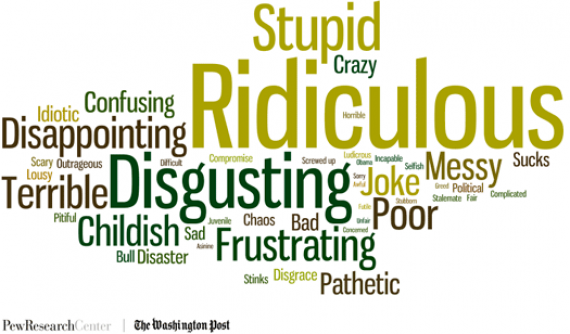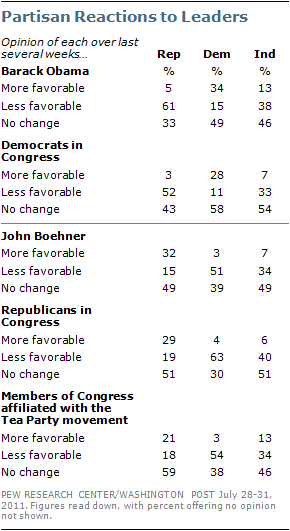Ridiculous, Disgusting, and Stupid: The Public Weighs In On The Debt Negotiations
The reviews are in on the debt negotiations, and the public isn't happy.
According to a new Washington Post/Pew Research Center poll, the public reaction to the just-concluded debt ceiling negotiations is decidedly negative:
Americans give overwhelmingly negative reviews to the fierce budget debate that has transfixed Washington over the past few weeks, and large numbers now think less favorably about the country’s political leaders, according to a new poll by the Washington Post and the Pew Research Center.
Asked for single-word characterizations of the budget negotiations, the top words in the poll — conducted in the days before an apparent deal was struck — were “ridiculous,” “disgusting” and “stupid.” Overall, nearly three-quarters of Americans offered a negative word; just 2 percent had anything nice to say.
“Ridiculous” was the most frequently mentioned word among Democrats, Republicans and independents alike. It was also No. 1 in an April poll about the just-averted government shutdown. In the new poll, the top 27 words are negative ones, with “frustrating,” “poor,” “terrible,” “disappointing,” “childish,” “messy” and “joke” rounding out the top 10.
Looking deeper into the poll, it’s clear that none of the players came out of this particular contretemps looking very good:
The debt ceiling debate has tarnished the image of both President Obama and Speaker Boehner – about a third say they have come to have a less favorable view of each leader in recent weeks, while relatively few say their impressions have improved. In both cases, a plurality says their opinion of these key leaders has not changed as a result of the budget negotiations.
When it comes to the parties in Congress, 42% say their impression of Republicans has become less favorable as a result of the budget negotiations, compared with just 30% who say the same about Democrats in Congress. Few say their impression of either party has improved (11% say this about Republicans, 13% say this about Democrats). And 37% say they have a worse impression of members of Congress who are affiliated with the Tea Party movement than they previously did, compared with 11% who say they now view Tea Party members more favorably.
Here are the hard numbers on how each of the parties was evaluated in the poll:
The assessment of respondents to a new CNN/Opinion Research Poll is fairly similar and just as dismissive of the actors in our just concluded melodrama:
A majority of Americans disapprove of the deal struck Sunday by President Barack Obama and congressional leaders that will raise the country’s legal borrowing limit, and three out of four believe elected officials have acted like “spoiled children.”
According to a CNN/ORC International poll conducted Monday during a House of Representatives vote on the legislation, 52 percent of Americans say they are opposed to the debt ceiling deal while 44 percent are in favor of it. The Senate passed the legislation Tuesday in a 74-26 vote.
Everyone disapproves of some part of the debt ceiling compromise,” CNN Polling Director Keating Holland said. “Republicans dislike the increase in the debt ceiling through 2013, Democrats dislike the lack of tax increases on businesses and higher-income Americans, and independents dislike both of those provisions.”
The spending cuts in the agreement were the only popular part of the bill, winning support from two-thirds of the public.
Seventy-seven percent of respondents said elected officials who have dealt with the debt ceiling have acted like spoiled children. Just 17 percent believe the politicians have acted like responsible adults.
So who won the debate over the debt ceiling?
“When three-quarters say that elected officials are behaving like spoiled children, it’s probably safe to say that there are no winners,” Holland said.
The overall approval rating for Congress, now at 14 percent, is at an all-time low. Sixty-eight percent of respondents disapprove of how the Republican leaders in Congress handled the debt ceiling, 63 percent disapprove of Democratic leadership and 53 percent disapprove of President Obama’s role in the agreement.
Obama’s overall approval rating holds steady at 45 percent, but his support among liberals, at 71 percent, remains at a record low and more than half of all Democrats say he gave up too much in the debt ceiling deal. Just one-third of Republicans polled said their party’s leaders gave up too much in the agreement.
If you look at the raw top-line numbers, it’s arguably the case that all sides came out bad in this, however that isn’t necessarily the case. Allahpundit dug further into the poll and found this:
Granted, hating Congress is a grand American tradition but 84% disapproval is something you don’t see quite so often, and it helps explain this National Journal showing that the majority of Americans have no confidence that Congress can do its job effectively:
Amidst a tumultuous fight over raising the debt ceiling, Americans are deeply dissatisfied with Washington and eager to elect fresh faces to Congress, raising warning flags for Democrats and Republicans alike. The poll showed discontent at about the same levels seen in the 2006 and 2010 “wave” elections.
The results appear in the latest United Technologies/National Journal Congressional Connection Poll. When asked if they think “most members of Congress have done a good enough job to deserve reelection or do you think it’s time to give new people a chance?” 79 percent of respondents said it was time for new people and only 10 percent thought that most members are doing a good enough job to deserve reelection.
While respondents were more favorably inclined toward their own representatives rather than Congress as a whole, a majority of respondents still thought that when it came to their own representative it was “time to give a new person a chance.” In the survey, 31 percent of respondents said that their member of Congress deserves reelection but 53 percent said it was time for a new person.
This is a figure that should give all members of Congress pause regardless of party. Before the 2010 election, which swept 87 new members into Congress, 58 percent of likely voters responded to a CBS News/New York Times survey that it was time for a new person. Granted that poll was right before the election and measured likely voters as opposed to all adults. Still, it’s a worrisome sign for members of Congress and a sign that the public is deeply dissatisfied with their performance in ways that echo that historic election.
Likewise when it comes to important problems facing the country, only 7 percent of respondents in the United Technologies/National Journal Congressional Connection Poll had a lot of confidence that Washington could make progress over the next year. Thirty-five percent expressed some confidence. But 35 percent expressed “not much confidence,” and 23 percent said they had “no confidence at all.” These numbers reveal even more dissatisfaction than in September of 2010—again, a red flag for Congress that the public has deep doubts about their ability to make progress on issues of importance to the nation.
It’s been something of a truism of American politics that Americans hate Congress but love their Congressman, which is why the incumbency re-election rates for Members of Congress, especially the House, have historically been in the 85% to 94% range. Even the vast turnaround of the 2010 elections didn’t break that average, with 87% of House incumbents and 84% of Senate incumbents who stood for election in November being sent back to Washington. This is why, in all likelihood, the GOP will hold on to the House and has an inside chance of gaining a small majority in the Senate in 2012 notwithstanding the obvious public discontent with Congress.
Nonetheless, it’s worth keeping something in mind. From 2006 to 2010, we had three game changing elections in a row. There’s no reason to believe that 2012 will be any different, especially given the passion that we’re likely to see at the Presidential level on both sides. If I were a Member of Congress I wouldn’t be resting on my laurels right now. Of course, after the past six weeks, I’m not sure I’d want to show my face in public either.






I suspect most congress critters will be running away from their laurels.
The ridiculous part is that raising the debt ceiling should have been part of the deal extending the Bush tax cuts.
Tax code reform could then have been part of a spending cuts deal.
I’m happy with what my Representatives did for the most part. I’m waiting to see how the bill that was passed works out.
Congress as a whole I’m not too happy with. The President has gone even lower in my eyes which is amazing since he was pretty low in my eyes in the first place. I have pretty much given up hope on him.
Sorry but I think polls about “Congress” are a complete and total waste of time. People don’t elect “Congress” and despite Boehner’s approval ratings across the country he won his last two elections with 66% and 68% of the vote respectively.
And President Obama is not going to run against “Congress” in 2012 so showing head to head polls between the entire body of our legislative branch and him alone is pointless.
Well, look…. The public certainly has the right, and the cause to be angry. But they tend not to understand all the aspects of it as well as say, the average Blog writer does. So let’s axamine it for a moment.
First, let’s remember, Congress does not operate in a zero-base budget world like everyone else. Rather they assume 8% growth per year, ( A policy put in place by the Democrats when they had an overwhelming majority) and anything less than that 8% growth of spending, they call a “cut”. THey tend to demonize anyone who pushes for such “cuts” which are actually merely a decrease in that rate of growth. Let’s say for example we manage to force the Dems to accept a 2% “cut”… what you have then, is still a 6% increase in spending.
There are no cuts there will never BE any cuts so long as the left has anything to say about it. The fact is, that the Democrats have never actually cut any program other than defense. Never, Never, Never… and they’re not about to start now.
Further, let’s recall, that as mentioned, the expiration of the Bush Tax cuts is looming. The Democrats have no intention of letting that stand, regardless of what damage is caused by it’s removal.
So what, then was this all about? Well, let’s try it this way;
Look at the amount of sound smoke and fury over getting the Democrats to agree to even consider a miniscule cut in the growth rate of government spending, and the growth of government itself, and you’ll begin to see what the American people are up against, with Democrats in any kind of position of power.